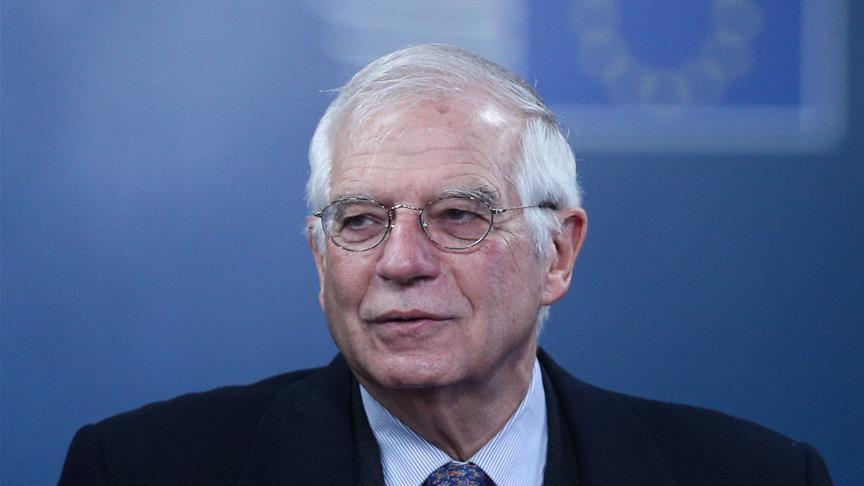
The EU High Representative for Foreign Affairs and Security Policy Josep Borrell. /Xinhua
The EU High Representative for Foreign Affairs and Security Policy Josep Borrell. /Xinhua
Editor's note: Jonathan Arnott is a former member of the European Parliament. The article reflects the author's opinions, and not necessarily the views of CGTN.
Like the plot of any old spy movie, the situation surrounding Russian opposition politician (or dissident, depending upon your point of view) Alexey Navalny is full of twists and intrigue. Unlike in fiction, the truth does not reflect well on any of those involved in recent events. In fiction there would be heroes and villains; but in real life, whether a hero can be found beneath everything is more doubtful.
The case has reignited the global tensions between Russia, the United States and the European Union. In recent years the EU and Russia have clashed over Crimea, whilst the rollercoaster relationship between the United States and Russia was one of the defining features of the Trump administration.
Josep Borrell, the European Union's high representative, is the eyes and ears of the EU's foreign policy. His recent visit to Russia received a fair amount of criticism from different political directions.
We all know the positions taken by the various actors within this case. Navalny, an outspoken critic of Russian President Vladimir Putin, came down with a mystery illness whilst on a flight from Tomsk to Moscow. After the plane made an emergency landing, Navalny was placed into a medically-induced coma and transferred to Berlin for specialist treatment. A German military laboratory said he was poisoned by the nerve agent Novichok. Investigative journalists from the Bellingcat group concluded that agents from the Russian Federal Security Service (FSB) were responsible, a claim hotly disputed by the Kremlin.
The Kremlin considers Navalny to be a criminal, on account of convictions for embezzlement, fraud and money laundering. Navalny's supporters argue the charges were politically motivated. Navalny's subsequent arrest and activation of the suspended sentence led to widespread protests in Russia.
In response to the German lab's finding last year, the EU introduced sanctions against senior Russian officials. Sanctions against Russia have, in general, had little effect. Russia's approach on the international stage is to assert strength at every stage.

Absorber columns either side of a snow-covered access road at the Gazprom PJSC Slavyanskaya compressor station, the starting point of the Nord Stream 2 gas pipeline, in Ust-Luga, Russia, January 28, 2021. /Getty
Absorber columns either side of a snow-covered access road at the Gazprom PJSC Slavyanskaya compressor station, the starting point of the Nord Stream 2 gas pipeline, in Ust-Luga, Russia, January 28, 2021. /Getty
Borrell rejects calls for Germany to "pull the plug" on the Nord Stream 2 gas pipeline which is being constructed to connect Russia with the EU. Borrell also understands the political reality that he has no power to change Nord Stream anyway: legally that is a matter for German companies, not the European Commission. In light of recent events, the EU has so far decided not to implement further sanctions.
Criticism of Borrell for the fact that he visited Russia at all, in my opinion, is overblown. It is the nature of diplomacy that such conversations need to take place in person.
The art of politics is being able to respond deftly to situations which arise and to stay well away from any unnecessary controversy. Putin, however, prefers an unconventional strategy aimed at throwing his opponents off balance, leading them to make mistakes. After making that choice, Borrell showed far less political acumen by being maneuvered into standing politely next to Russian Foreign Minister Sergey Lavrov.
The Kremlin, keen not to pick a fight with the United States at this specific moment after the inauguration of President Joe Biden, doesn't mind having a battle with the European Union. Rather than taking the EU's foreign policy clout seriously, it believes that foreign policy power still effectively resides with the EU's member states.
On the same day as Borrell's visit, Russia expelled Polish, German and Swedish diplomats after accusing them of participating in anti-government protests.
Whether or not the allegation is truthful, and it would indeed be a serious one if it were true, those diplomats would have done well to maintain substantial distance between themselves and any anti-government protests. Diplomats are within their rights to observe, but of course should never participate in another country's internal affairs. With tit-for-tat expulsions of Russian diplomats, the narrative could easily shift from Navalny to the mechanics of a diplomatic row between Russia and the EU.
For now, this is merely a war of words. Borrell's use of particularly scathing language about EU-Russia relations, describing them as being at their "lowest level," is a common political tactic. Politicians frequently use strong rhetoric to mask a lack of concrete action.
(If you want to contribute and have specific expertise, please contact us at opinions@cgtn.com.)

